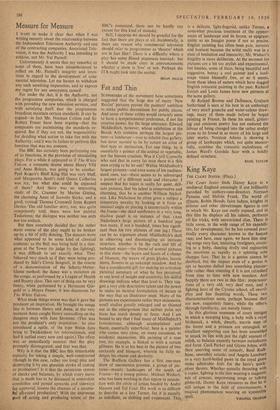Measure for Measure •
I WANT to make it clear that when I was writing recently about the relationship between
the Independent Television Authority and one of the contracting companies, Associated Tele- vision, it was the Authority I was intending to criticise, not Mr. Val Parnell.
Unfortunately it seems that my remarks. or some of them, have been misunderstood to reflect on Mr. Parnell's integrity and inten- tions in regard to the development of com- mercial television. Let me hasten to withdraw any such unwitting imputation, and to express my regret for any annoyance caused.
For under the Act, it is the Authority, not the programme companies, which is charged with providing the new television services, and
with satisfying itself that the programmes broadcast, maintain certain standards. It can be
argued—in fact Mr. Norman Collins and Sir Robert Fraser have been arguing—that the companies are maintaining the standards re- quired. But if they are not, the responsibility for deciding what action to take lies with the Authority; and it was its failure to perform this function that was my concern. -
The BBC has certainly been performing one of its functions, in the provision of stimulating plays. For a while it appeared as if The White Falcon, a romantic drama about Henry VIII and Anne Boleyn, was going to be another.
Paul Rogers's Bluff King Hal was very bluff,
and Margaretta Scott's cold Queen Catherine was icy; but what else could be expected
of them? And there was an interesting study of Dr. Cramer by Marius Goring, the charming Anne of Jeanette Sterke, and a good, cynicaff Thomas Cromwell from Rupert Davies. The old familiar story, too, was quite competently told; there were few painful Tudorisms; the dialogue was neither too arch nor too archaic.
But then somebody decided that the rather static course of the play ought to be broken up by a bit of jolly dancing. The dancers wore what appeared to be some kind of classical costume; as 'the Ball was being held in a dun- geon at the Tower (to judge by the lighting).
it was difficult to see exactly what. They behaved very much as if they were being pro- duced by Saki's Clovis Sangrail, in the course of a demonstration of the Schartz-Metter- klume method; the dance was a variation on the conga, as performed by a League of Health and Beauty class. This sort of thing can be very funny, when performed by a Hermione Gin- gold or a Moyra Fraser; it was disastrous for The White Falcon.
What made things worse was that it gave the producer an inspiration. He brought the conga line in between Henry and Anne, at the very moment Anne caught Henry canoodling on the dungeon steps with Jane Seymour. (This was
not the producer's only inspiration : he also introduced a rattle, of the type Welsh fans bring to Twickenham for internationals, and had it rattled every now and again.) The effect was so immediately comical that the play promptly disintegrated; and that was that.
Why is it that the BBC has this remarkable capacity for taking a simple, well-constructed (though in this case, rather too long) play and destroying it by one ghoulish stroke of casting or production? Is it that the pernicious system of checks and balances, by which every move that is made has to be discussed in somnolent committee and passed upwards and sideways for approval, lessens the chances of a success- ful all-round production? With the enormous pool of acting and producing talent at the
BBC's command, there can be hardly any excuse for this kind of mistake.
Still, I suppose we should be grateful for the fact that there are plays at all. Incidentally, is there any reason why commercial television should refer to programmes as 'theatre' which are in fact film? There is a difficulty where, a play has some filmed sequences inserted : but it should be made clear in announcements whether a show is 'live' or not. Perhaps the ITA might look into the matter.
BRIAN INGLIS


































 Previous page
Previous page